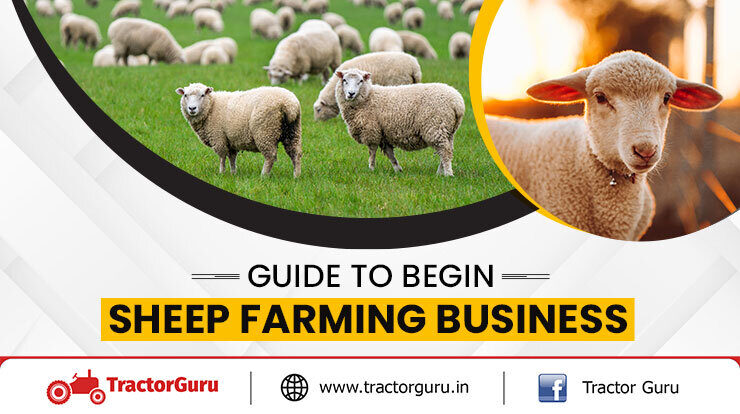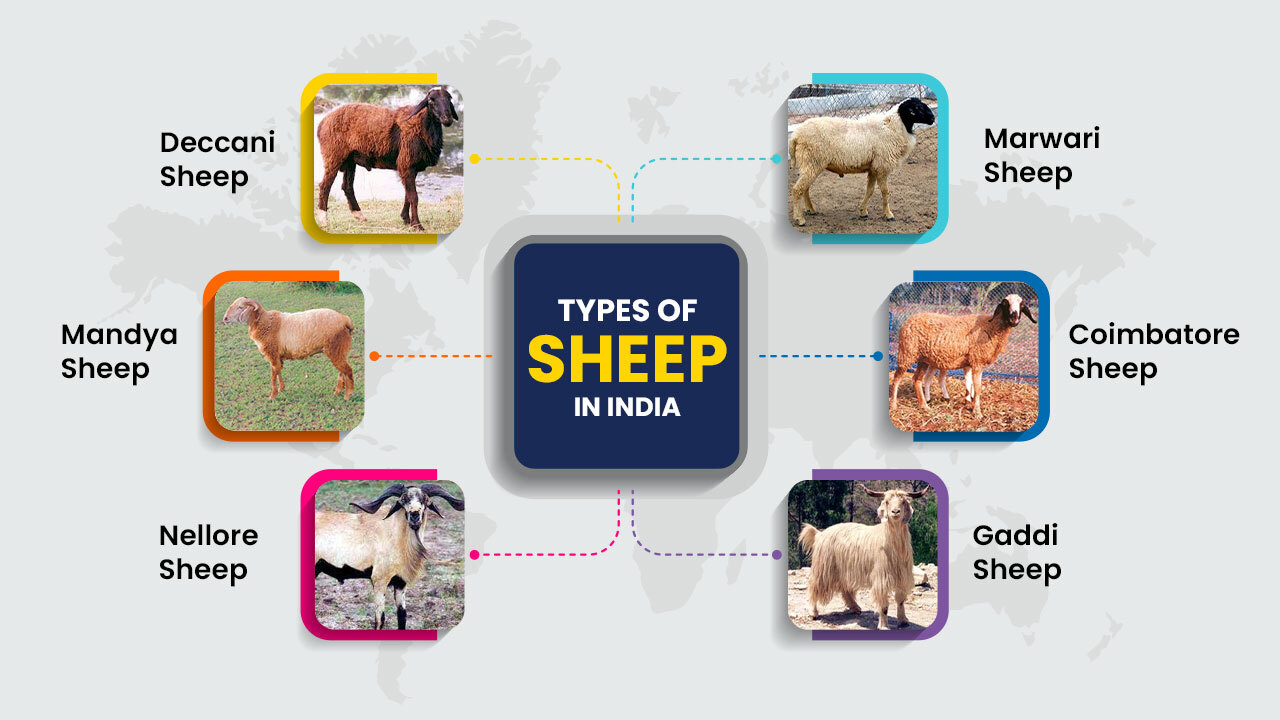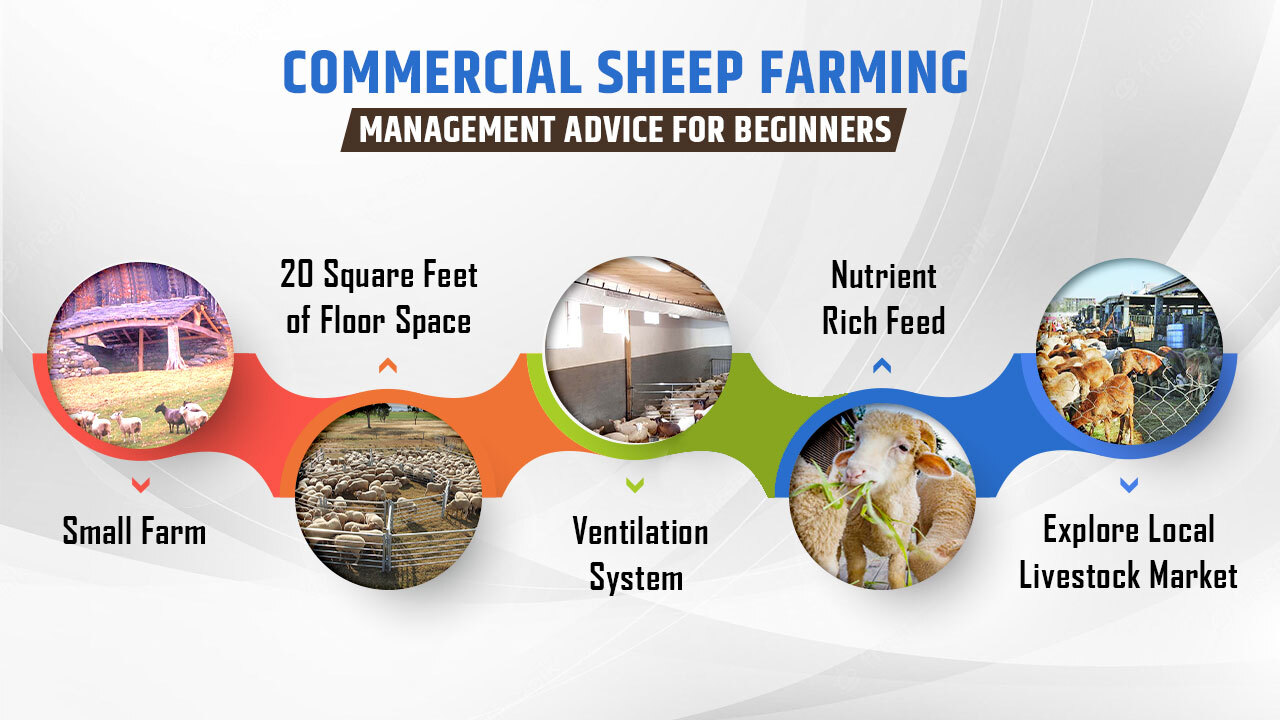Ultimate Guide to begin Sheep Farming Business in India

Sheep Farming Business in India
Are you engage in Animal Farming Business? If Yes, we have another reliable income source for you with substantial international market demand. In this blog, we will talk about Sheep farming, the types of sheep commonly used in Sheep Farming. And the benefits and management of the Sheep Farming business and Sheep Farming business plan in India.
Raising and breeding domestic sheep is known as sheep farming or sheep husbandry. And it is a type of animal husbandry field. The main reasons sheep are raise are for their meat, milk, and fibre. They also produce parchment and sheepskin.
Types of Sheep in India

Followed by Australia, China’s mainland leads the world in sheep production. India’s growing meat lovers population is giving people a choice to engage in commercial sheep farming. Depending on the region, India has a wide variety of sheep breeds.
Now, let’s talk about the best breed of sheep that can be used by beginners in sheep farming. Including their traits and performance-
- Deccani Sheep- In essence, the Deccani Sheep breed is a combination of the woolly sheep of Rajasthan and the hairy sheep of the States of Andhra Pradesh, Telangana, and Tamil Nadu. These sheep are raise for both their wool and mutton. The Mumbai-Deccan Region, along with some of Andhra Pradesh, Telangana, and Karnataka, is home to most of this sheep breed. This sheep has a coloured fleece which is black and grey. Tiny and tough, the sheep ideally suite to poor pastoral circumstances. Since these sheep are good at producing wool, an annual wool yield of 5 kg per sheep on average can be anticipated. However, the Deccani Sheep’s wool is of low quality and primarily consists of hair and fibres, mainly used to make blankets.
- Mandya Sheep- Mandya District in Karnataka is where you may mostly find Mandya sheep. This breed has a compact physique with a typical reversed “U” conformation when viewed from the back. An adult male sheep typically weighs 35 KG, but a female sheep weighs 25 KG. Compared to other Indian sheep breeds, this one is thought to have the best mutton type of confirmation.
- Nellore Sheep- The Nellore Sheep breed is primarily found in Andhra Pradesh’s Nellore, Prakasam, and Ongole districts and in select areas of Telangana. However, due to its excellent climatic adaptation, this breed may be raise wherever in India. This breed resembles a goat and is the tallest of all the kinds in India. Regarding body weight, male sheep reach 36–38 kg, and female sheep, with proper farm management practices, get 28–30 kg. This breed features large ears, a long face, and a thick coat of shirt hair all over its body. In addition, most sheep have a red appearance, that’s why they are known as Nellore Red.
- Marwari Sheep- This rugged breed of sheep produces a rougher carpet variety of white wool and mixed hairy makeup. This sheep breed is primarily found throughout Jodhpur and Jaipur District in Rajasthan. These sheep breeding flocks are raise in Rajasthan’s Balmer and Pali districts. In addition, the sheep breeds move to areas in Uttar Pradesh, Madhya Pradesh regions, and occasionally even to the path of Maharashtra. These sheep have an excellent tolerance for illness and worms. And a high survival rate because of their great resistance. These breeds produce between 1.0 and 1.8 kilograms of wool per sheep yearly.
- Coimbatore Sheep- Sheep from the Coimbatore area of Tamil Nadu State make up most of this breed. The primary objective of raising these sheep is wool. With black or purple bands covering the head and neck regions, this sheep breed grows to a modest weight. Its colour is white. In adult female sheep, between 30 and 35 per cent are hornless. An adult weighs approximately 25 kg, but a female sheep weighs 20 kg on average.
- Gaddi Sheep- The Gaddi sheep are a small breed raised for their wool in the Jammu region of Jammu and Kashmir, namely in the Kishtwar and Bhadarwah Tehsils. Sheep found to have horns on the males but not on females. Typically, animals have brown hair on their faces and white fleece. Average yearly consumption of 1.15 kg per sheep can be anticipated for this breed of beautiful, lustrous wool, which is often pest safe. High-end Kulu blankets and shawls made from this type of sheep’s undercoat.
Commercial Sheep Farming Management Advice for Beginners

One of the most basic and uncommon sheep farming tips that no one must have told you about regarding Sheep management. Which is that you don’t need costly houses; as long their basic housing needs met, they are satisfy. Even you can raise them with other livestock animals in small-scale production, but for commercial sheep farming or production, you have to make a separate and suitable house for them. Start with a few animals even though you are a prominent investor. Then, go for large-scale farming once you have learned the ins and outs of growing sheep and goats.
Usually, an adult sheep requires about 20 square feet of floor space, a good ventilation system. And dry and clean space to ensure a flow of sufficient air and light inside the house. In addition, sheep typically prefer to eat many plants and cones. Therefore, proper nutrition is essential for healthy growth and optimal output.
Additionally, high-quality food promotes animal health. A sufficient supply of fresh water and nutrient-rich feed is also necessary to profit. High-quality feed also keeps animals healthy, productive, and disease-free.
Although you might try your local livestock market for marketing purposes, it would be better if you created your marketing strategies before starting a sheep farm. You might even consider going international if you have the appropriate services. These are some tips for Sheep Farming that you should be aware of before starting your sheep farming business.
Benefits of Starting a Sheep Farm
Sheep farming has the following benefits:
- Sheep require less labour than other types of livestock and do not require expensive buildings to house them. As a result, the flock may quickly multiply, and the foundation stock is not too expensive.
- Sheep are efficient at turning grass into wool and meat.
- Compared to other types of livestock, sheep will consume a variety of plant species. Because of this, they work well to eliminate weeds.
- Sheep rarely cause any tree damage, unlike goats.
- The shepherd has three sources of income the production of wool, meat, and dung.
- Their lips’ shape enables them to clean grains lost after harvest, turning waste feed into valuable goods.
- Mutton is one type of meat that no community in India has any objections against. And the ongoing development of superior breeds for mutton production will have a significant impact on India’s rising economy.
Is Sheep Farming Profitable?
In ideal circumstances, one can make respectable profits from India’s sheep farming business. As the need for meat increases, sheep farming remains a very profitable industry. You should create a thorough sheep farming business plan and act in accordance with it before beginning sheep farming in India.
With a good sheep farming business strategy, you need commitment. You would need at least a few hundred ewes, possibly more than 500, to earn a profit from farming sheep. While some farmers rely heavily on their revenue from sheep farming. Then growing sheep is more frequently a side or supplemental business on a farm. Therefore, Sheep Farming Project Report must be deducted from the Net Profit in Sheep Farming in order to determine the Total Gross Income from Sheep Farming:
Do note that most frequently, unexpected illnesses and sheep deaths are cause by the rainy season. Therefore, it will be a successful business if the proper disease preventive steps performed, and food is provide. However, sheep farming investment does not only ask for money. It equally asks the person to invest his necessary time in caring for the sheep farm. Therefore, due to a lack of time invested, people have lost much money in this venture.
Organic and Sustainable Sheep Farming Guide
While organic sheep farming presents difficulties for farmers who cannot raise their flocks without using chemicals, antibiotics, or pesticides, it also has several long-term advantages.
- First, the farm needs to be register with an authorize organic control authority that demands a strict set of requirements fulfill to produce organic sheep.
- These organic guidelines ensure the animals’ welfare is a top priority.
- To assure that animals are genuinely free range, organic criteria involve food, living conditions, the use of hormones and antibiotics, transport, and slaughter.
- These criteria imply that organic or intensive farming methods deliver the utmost welfare standards for farm animals.
- The two essential elements in regulating the health and welfare of farm animals in organic systems are feeding and breeding.
Conclusion
You can start a small-scale sheep farming business using the above sheep farming strategies and make a healthy profit. Keep in touch with TractorGuru for updates or information about sheep farming.
Related blogs:



